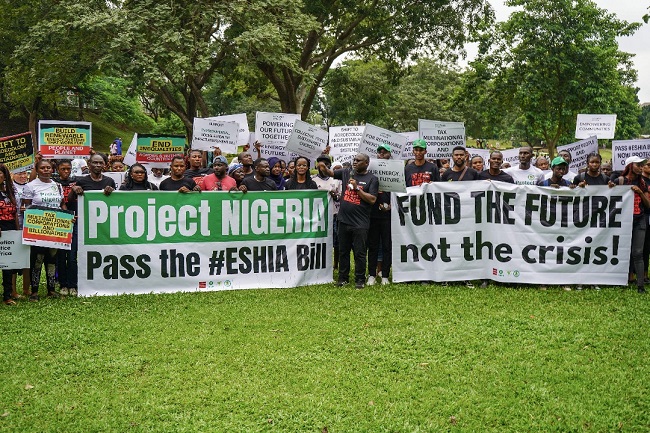
By Deborah Olaoluwa
From the Niger Delta to Lamu, from Johannesburg to Dakar, communities across Africa joined the global Draw the Line mobilisations this week, sending a powerful message: Africa will not be a sacrifice zone for fossil fuels.
As part of over 600+ actions in more than 85 countries worldwide, including more than 100 across Africa — thousands on the continent rejected fossil fuel expansion, elite corruption, and corporate capture, while uplifting the solutions Africa needs: community-led renewable energy, food sovereignty, democracy, and dignity.
From Nairobi, where a carnival filled the streets with music, costumes, and banners calling for an end to fossil fuel colonialism, to Johannesburg, where workers, youth and faith leaders marched together linking the rising cost of living to energy injustice, to Cotonou, where artivists transformed public spaces into powerful murals and performances against oil and gas expansion, Africans showcased both resistance and creativity. These mobilisations highlighted that the fight for climate justice is not only about survival, but also about reclaiming culture, community, and hope.
The mobilisations come at a crucial moment. World leaders will meet at the UN General Assembly in September, just six weeks before COP30 in Belém, Brazil — a summit that will define whether the world keeps the promise of 1.5°C alive. Across Africa, communities made it clear that fossil fuel colonialism must end, that polluters must pay their climate debt, and that the future lies in decentralised, locally owned renewable energy systems. The actions linked the climate crisis to everyday struggles with food insecurity, energy poverty, unemployment, and shrinking civic space, showing that climate justice is inseparable from democracy, human rights, and peace.
Regina Baiden, Africa Regional Director of 350.org stated that “Africa is on the frontlines of a crisis we did not create, yet we are paying the highest price through floods, droughts, cyclones, and heatwaves. This week, our communities have drawn the line and said: no more fossil fuel colonialism, no more debt traps, no more false solutions. We are demanding a just transition that puts people before polluters, prioritises renewable energy that is community centered, and guarantees our right to live in dignity.”
Christian Hounkannou, Africa Francophone Organiser at 350.org added that “Fossil fuels are destroying our lands, poisoning our waters, and threatening our food systems, while ordinary people are left in poverty. What we are building instead are African solutions like solar projects that power schools and hospitals, agroecology that sustains our farmers, and people-led movements that defend our democracy. This mobilisation is just the beginning. As we head into COP30, our demand is simple but urgent: cancel illegitimate debt, make polluters pay their climate debt, and fund the transition our people deserve.”
As the world turns to COP30, Africa’s message is clear: the time for empty promises is over. Leaders must end fossil fuels, unlock real climate finance, and put communities at the heart of the transition.











